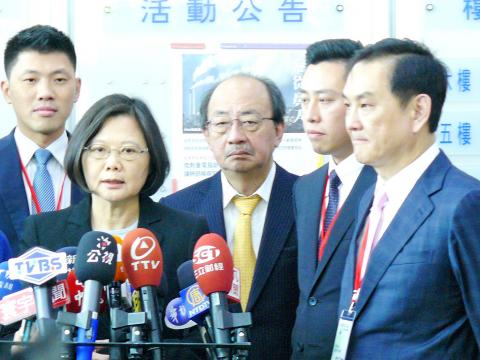President-elect Tsai Ing-wen (蔡英文) yesterday said she would “take responsibility” for contradicting previous statements that the nation’s president should not also be head of the ruling party, comments she made in criticizing President Ma Ying-jeou (馬英九).
“The ongoing and changing political situation” and the Democratic Progressive Party’s (DPP) new position as the majority party in the legislature made it necessary for her to double as president and DPP chairperson, she said at a news conference at the Hsinchu Science Park after she met with semiconductor industry officials.
DPP officials on Wednesday said that Tsai would remain as party leader after her inauguration on May 20, prompting journalists at the news conference to ask her about the shift in her stance.

Photo: CNA
Taiwan is beset by “comprehensive challenges,” and it would take “an efficient, well-coordinated team” to implement her platform, for which the DPP had made amendments to its party charter, she said.
The DPP charter has been changed to bar Cabinet members from holding positions in party organizations, so that talent and competence, rather than party membership, would be the key factors in picking Cabinet members, she said.
Political appointees in her administration would not be limited by a requirement that Cabinet members must be DPP Central Standing Committee members or even DPP members, guaranteeing her freedom in selecting her Cabinet, Tsai said.
To prevent a situation where “the party’s will trumps the will of the people,” another set of amendments to the DPP charter make the Central Standing Committee more reflective of the will of the electorate by adding DPP local government heads, caucus conveners and public officials to the committee, Tsai said.
The changes to the DPP charter would require substantial coordination with the 13 counties and cities that are led by DPP members and the Legislative Yuan, while “strenuous efforts” would be required to coordinate between the central government and local governments, legislative activities and the Executive Yuan, she said.
“The president doubling as the party chairperson is the most suitable arrangement to coordinate those groups that each represents some portion of the electorate,” she said.
Tsai said that she could “guarantee” that the arrangement of a president from the DPP doubling as the party’s chairperson would not lead to a party that is unaccountable to the public or “ruled by one individual,” because such behavior “is not in the DPP’s tradition.”
The arrangement is simply meant to serve as “a communications platform” for the presidency, she said.

The CIA has a message for Chinese government officials worried about their place in Chinese President Xi Jinping’s (習近平) government: Come work with us. The agency released two Mandarin-language videos on social media on Thursday inviting disgruntled officials to contact the CIA. The recruitment videos posted on YouTube and X racked up more than 5 million views combined in their first day. The outreach comes as CIA Director John Ratcliffe has vowed to boost the agency’s use of intelligence from human sources and its focus on China, which has recently targeted US officials with its own espionage operations. The videos are “aimed at

STEADFAST FRIEND: The bills encourage increased Taiwan-US engagement and address China’s distortion of UN Resolution 2758 to isolate Taiwan internationally The Presidential Office yesterday thanked the US House of Representatives for unanimously passing two Taiwan-related bills highlighting its solid support for Taiwan’s democracy and global participation, and for deepening bilateral relations. One of the bills, the Taiwan Assurance Implementation Act, requires the US Department of State to periodically review its guidelines for engagement with Taiwan, and report to the US Congress on the guidelines and plans to lift self-imposed limitations on US-Taiwan engagement. The other bill is the Taiwan International Solidarity Act, which clarifies that UN Resolution 2758 does not address the issue of the representation of Taiwan or its people in

US Indo-Pacific Commander Admiral Samuel Paparo on Friday expressed concern over the rate at which China is diversifying its military exercises, the Financial Times (FT) reported on Saturday. “The rates of change on the depth and breadth of their exercises is the one non-linear effect that I’ve seen in the last year that wakes me up at night or keeps me up at night,” Paparo was quoted by FT as saying while attending the annual Sedona Forum at the McCain Institute in Arizona. Paparo also expressed concern over the speed with which China was expanding its military. While the US

SHIFT: Taiwan’s better-than-expected first-quarter GDP and signs of weakness in the US have driven global capital back to emerging markets, the central bank head said The central bank yesterday blamed market speculation for the steep rise in the local currency, and urged exporters and financial institutions to stay calm and stop panic sell-offs to avoid hurting their own profitability. The nation’s top monetary policymaker said that it would step in, if necessary, to maintain order and stability in the foreign exchange market. The remarks came as the NT dollar yesterday closed up NT$0.919 to NT$30.145 against the US dollar in Taipei trading, after rising as high as NT$29.59 in intraday trading. The local currency has surged 5.85 percent against the greenback over the past two sessions, central